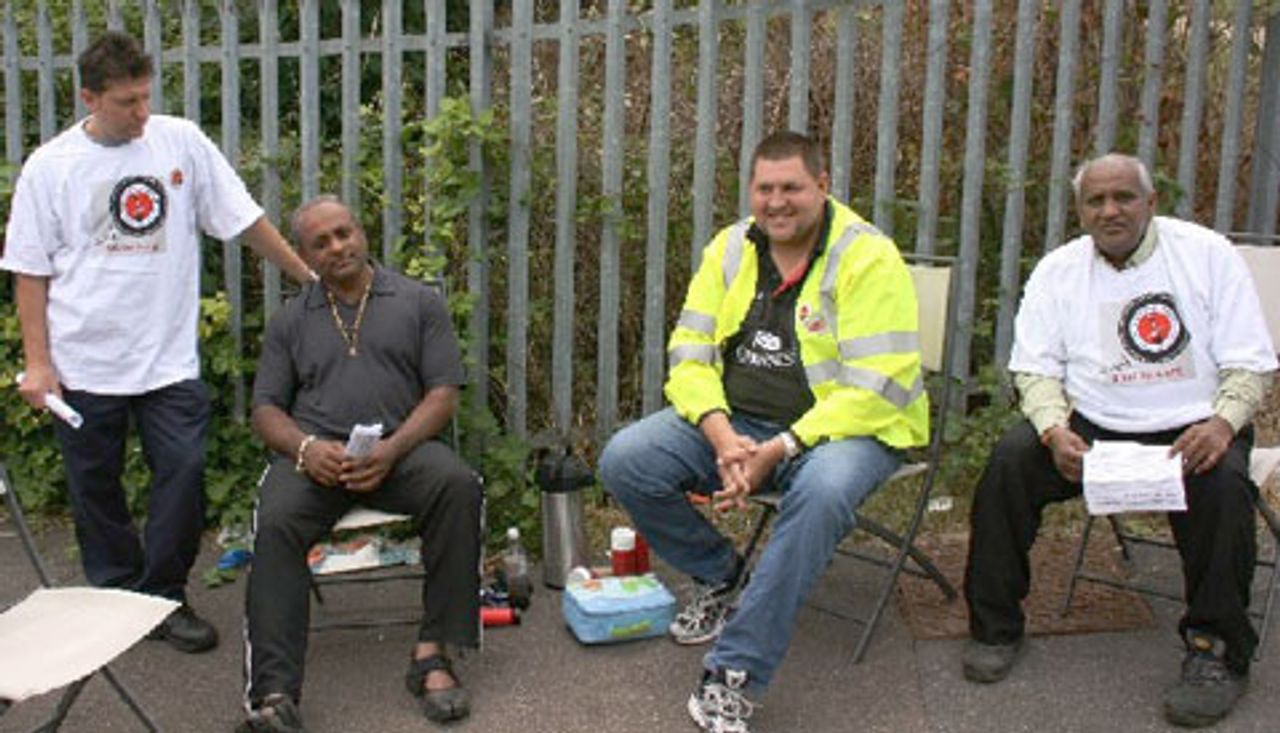Some 11,000 postal workers in London took strike action this week, following a two-day strike in June. Delivery workers struck on Wednesday, distribution and logistics staff on Thursday, and mail sorting centres on Friday including Nine Elms and Mount Pleasant. Attempts by Royal Mail to obtain an injunction banning the strikes failed.
Other strikes, some unofficial, have taken place across the UK and reports suggest up to 300 Royal Mail workplaces have applied to hold a strike ballot.
 Pickets at Neasden depot
Pickets at Neasden depotThe Communications Workers Union (CWU) has called a national “day of action” on July 17. The CWU has been forced to call the action because its collaboration thus far with Royal Mail in imposing rationalisations and speed-up on its members is no longer deemed adequate by management.
Royal Mail declared that it was “simply asking for the union to honour existing agreements on modernisation and changes in working practices—including the agreement its leaders signed in the presence of the TUC in 2007—to address falling volumes and to improve efficiency in London as our people have already done successfully in units throughout the UK.”
The CWU even offered a three-month no-strike deal to allow for talks on modernisation, which Royal mail rejected. CWU Deputy General Secretary Dave Ward went so far as to denounce Royal Mail for being “the biggest block to modernisation” for rejecting “the best deal we—or any other union—can offer, which is for three months of no industrial action and focused negotiation on modernisation”.
“We need to return to the agreement and negotiate change now,” he pleaded.
The entire postal service faces massive cuts in connection with the Labour government plans, temporarily suspended, to sell off 30 percent of the Royal Mail to private companies. Business Secretary Lord Mandelson told the Parliamentary Business Committee this week privatisation had been halted only because of difficult market conditions.
 Jim
JimJim, a driver at Nine Elms mail centre told World Socialist Web Site reporters that, over the 22 years he had worked for Royal Mail, it had turned from a public service into a business. It had made a massive profit this year by selling off its properties and had cut 30,000 jobs.
Private companies had cherry-picked the collection of business bulk mail in cities, but Royal Mail was still delivering it at a reduced price. Further privatisation will mean the break-up of the service with the smaller rural communities which depend on the Royal Mail left to fend for themselves, Jim explained.
“The media always seems to be on management side. Management always seem to get their point of view across saying we are ‘greedy postmen’, but we don’t get any communication from our union HQ.”
“The government says they don’t want to get involved, but they control Royal Mail. Although privatisation has stopped now it will happen because Labour and the Tories both want it.”
“I’ve lost faith in the Labour Party. I can’t understand why we are still paying into it through our union funds. The Labour Party rose from a need, a necessity and maybe that will have to happen again and we will get someone new.”
 Steve
SteveSteve added, “After I started work in 1976 Thatcher and the Tories were in power. When my dad died it was the same year that Tony Blair came into power and I put a red rose on his grave thinking things would change at last. But they turned out just as bad. Now I’m completely disillusioned with all the three major parties.”
“It seems to me these people, capitalists, who have got money want more money. People say Bill Gates, just one man, could end Third World debt on his own.”
At the huge regional distribution centre at Neasden in West London, strikers mounted a picket. Managers, cleaners, maintenance staff and drivers from other Royal Mail depots and agency staff were going into work. Pickets were told by union officials that many of them are in different CWU branches and had not been balloted, or were about to be. Despite this, the strikers said workers at non-striking depots were refusing to handle work transferred from Neasden.
Many depots in London had closed over recent years and workers made redundant or transferred to other depots, such as Rathbone Place or Mount Pleasant in central London. These were now threatened with closure.
One worker, referring to the bonuses received by Royal Mail managers (Chief executive Adam Crozier is reported to have received a bonus of up to £370,000 taking his total package to more than £1 million) said, “Royal Mail say they are not making any money, but look at the big bonuses managers are getting while we are getting a pay freeze. One minute there’s record profits, the next there is a pay freeze.”
Many of the strikers explained that initially they thought the selective ballots deployed by the CWU might be a new way of fighting, as long as all the offices eventually were on strike together. However, as delivery vans from both the Royal Mail and private sector rolled in and out, the implications of the CWU’s divisive policy became clear.
One postal worker explained that the present divisions were sown after the introduction of bonus and incentive schemes for different jobs many years ago, such as at the Islington depot in north London where he used to work and is now closed. Within two months of their introduction, significant differences were established between jobs—just as he had warned would happen.
“Afterwards workers came up to me and said, ‘You were right’. Divide and conquer has been the policy since then... Many bigger industries than Royal Mail have been destroyed in this way.”
Workers explained that drivers from other depots wanted to go out on strike with them, but were being told by the CWU that they had to cross picket lines because they had not been balloted and would be breaking the anti-trade union laws. There is the basis for a national strike, but workers are confronting a union leadership that is trampling on the militant traditions of postal workers.
There was general discontent at the CWU’s opposition to demands for a national strike to resist Royal Mail and the Labour governments’ plan to slash jobs, close depots and push through a major productivity increase. On the relations between the Labour party and the CWU bureaucracy, one worker described the evolution of former general secretary of the CWU, Alan Johnson (1993-1997), who is now Home Secretary in the Labour government: “Alan Johnson once brought us out on strike for four weeks. Now he’s leading the privatisation of Royal Mail!”
Asked about separate ballots, one worker declared, “We think it’s a ridiculous idea. No function or job should be divided. The national executive is a joke. Do they really care? They are looking after themselves in their ivory towers.”
Another worker added, “We need to get all offices out. It’s causing divisions. People are saying you didn’t walk out when we did, so we are not going to walk out when you do. It’s causing tension between the staff.”
Another wondered why the strike at the sorting offices had been suspended at the last minute last month: “I told my union official that somebody at the top is taking a backhander. The trade unions have been balloting for centuries. How have they screwed this one up? Every month I pay £12 to the union, but not once have they said here’s some money for groceries or whatever—no money. Yet when they go to conferences they get at least £200 expenses.
“I have no confidence in the union. We should do what the French do and bring the country to a standstill—the French revolution!”
Another added, “That’s what we should have—a revolution, for the workers.”
“I hoped that the oil refineries strikes had led to an all out national strike,” another said. “I was disappointed they settled. I wanted the whole country to come to a standstill.”
